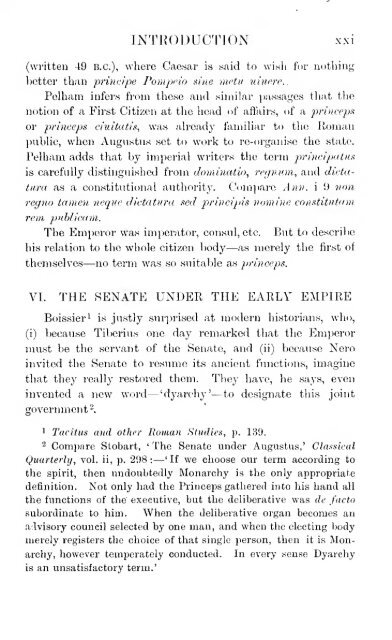Create successful ePaper yourself
Turn your PDF publications into a flip-book with our unique Google optimized e-Paper software.
INTRODUCTION xxi<br />
(written 49 B.C.), where Caesar is said to wisli for nothing<br />
l)etter than principe Pompeio sine metu uiuere.<br />
Pelhara infers from these and similar passages that tlie<br />
notion <strong>of</strong> a First Citizen at the head <strong>of</strong> affairs, <strong>of</strong> a princeps<br />
or princeps ciuitatis, was ah'cady fainihar to the Roman<br />
pubhc, when Augustus set to work to re-f)rganise the state.<br />
Pelham adds that by imperial writers the term principatus<br />
is carefully distinguished from dominatio, regnum, and dictatura<br />
as a constitutional authority. Compare Ann. i 9 non<br />
regno tamen neque dictatura sed principis nomine constitutam<br />
rem publicam.<br />
<strong>The</strong> Emperor was imperator, consul, etc. But to describe<br />
his relation to the whole citizen body—as merely the first <strong>of</strong><br />
themselves—no term was so suitable as princeps.<br />
VI. THE SENATE UNDER THE EARLY EMPIRE<br />
Boissier^ is justly surprised at modern historians, who,<br />
(i) because Tiberius one day remarked that the Emperor<br />
must be the servant <strong>of</strong> the Senate, and (ii) because Nero<br />
invited the Senate to resume its ancient functions, imagine<br />
that they really restored them. <strong>The</strong>y have, he says, even<br />
invented a new word— 'dyarchy'— to designate this joint<br />
government^.<br />
1 <strong>Tacitus</strong> and other Roman Studies, p. 139.<br />
^ Compare Stobart, ' <strong>The</strong> Senate under Augustus,' Classical<br />
Quarterly, vol. ii, p. 298:— 'If we choose our term according to<br />
the spirit, then undoubtedly Monarchy is the only appropriate<br />
definition. Not only had the Princeps gathered into his hand all<br />
the functions <strong>of</strong> the executive, but the deliberative was de facto<br />
subordinate to him. When the deliberative organ becomes an<br />
advisory council selected by one man, and when the electing body<br />
merely registers the choice <strong>of</strong> that single person, then it is Monarchy,<br />
however temperately conducted. In every sense Dyarchy<br />
is an unsatisfactory term.'<br />
.

















